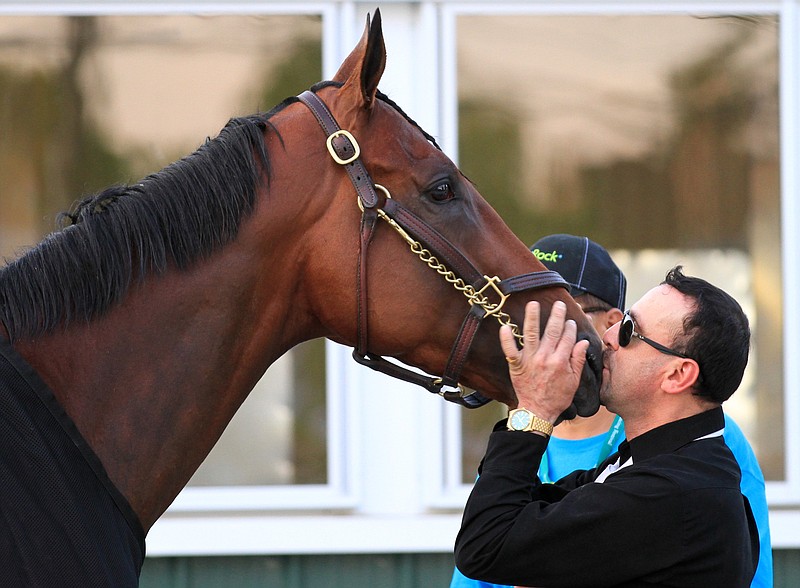Read more
American Pharoah runs into history with Triple Crown, first one in 37 years
Finally.
Powerfully.
Perfectly.
Those are the three words that first crossed my mind as American Pharoah crossed the Belmont Stakes' finish line Saturday evening to become horse racing's first Triple Crown winner in 37 years.
This is what a Triple Crown winner is supposed to look like, along with a couple of other words such as "majestic" and "graceful."
Maybe those are the reasons why Pharoah is just the 12th Triple Crown champion ever. Maybe the 36 years between Affirmed in 1978 and Pharoah just didn't have a horse that was good enough.
Or as 62-year-old Hall of Fame trainer Bob Baffert said of the horse that won him his first Triple Crown in his fourth try: "It wasn't me, it was the horse. I feel like I have a very special horse. He's just a great horse, and it takes a great horse to do this."
True greatness can become under-appreciated when it appears too often in a short period of time. Great as Hank Aaron, Frank Robinson and Willie Mays all were on a baseball diamond, they may not have been appropriately praised as three of the most amazing players ever until they retired.
The same could be said of the last two Triple Crown winners before American Pharoah: Seattle Slew in 1977 and Affirmed the following year.
I was in the Churchill Downs clubhouse when Affirmed won the Kentucky Derby. And as emotional as Affirmed's three victories over Alydar were that spring, each won by increasingly closer margins, it didn't seem all that special at the time.
Part of that was due to the fact that Affirmed was the third Triple Crown winner in six years. Secretariat had won his sport's biggest prize in 1973, routing Sham and the rest by 31 lengths in the Belmont, a victory that still sends chills up my spine and tears to my eyes.
Much as there may never be another Babe Ruth, or Frank Sinatra, or Picasso, Secretariat was obviously a freak of nature, never to be duplicated. In fact, when he died, the necropsy revealed his heart was more than twice the size of a normal thoroughbred's.
Or as Dr. Thomas Swerczek noted of Big Red's big ticker, "It was just this huge engine."
But Seattle Slew displayed a pretty efficient engine in winning the Triple in 1977; then Affirmed rolled to victory the very next spring.
At that moment, so much greatness in so short a period of time, it was easy to forget that 25 years had come and gone between Citation's Triple in 1948 and Secretariat's trifecta.
Beyond that, at least for me, Affirmed kind of broke the hearts of a lot of native Kentuckians like myself, given that he'd been bred in Florida while Alydar was born in the Bluegrass at Lexington's storied Calumet farm, which I toured as an 11-year-old, enchanted by its white fences and handsome barns that were nicer than most homes.
So when Spectacular Bid failed to become a third straight Triple Crown winner in 1979, losing down the stretch of the Belmont, it felt like no big whup. There'd be another one the next year, or the year after that. Then began the close-but-no-cigars -- not to be confused with Cigar, who won a thoroughbred record 16 straight races from 1995 into 1996 but failed to run in the Kentucky Derby as a 3-year-old.
There were 13 in all before American Pharoah broke the streak, a baker's dozen of coulda/woulda/shouldas, beginning with Spectacular Bid and ending a year ago with California Chrome.
In between? Pleasant Colony (1981), Alysheba ('87), Sunday Silence ('89), Baffert horses Silver Charm ('97) and Real Quiet ('98), Charismatic ('99), War Emblem (2002), Funny Cide ('03), Smarty Jones ('04), Big Brown ('08) and I'll Have Another (2012).
And that doesn't include Barbaro, who cruised to victory in the Derby but broke his leg in the Preakness.
Any of those horses could have won the Triple Crown. None did. And because of that, thoroughbred racing, once known as the Sport of Kings, appeared to die a little bit in the public eye, an increasingly shrinking fan base seeming to adopt more strongly the Who classic "Won't Get Fooled Again" with each fresh disappointment.
Then came American Pharoah, who followed a strong Derby win with a ridiculously easy victory over a rain-wrecked Pimlico course in the Preakness. By Saturday, he was going off at 3-5 odds, the beautiful bay colt once more bringing hope to a sport desperately in need of a superstar.
And it wasn't just the horse with the tail half bitten off in his early childhood that captivated. Jockey Victor Espinoza, the 11th of 12 children, left his home in rural Mexico at the age of 15 to drive a bus so he could pay for jockey school. Twice previously he'd come to the Belmont aboard War Emblem and California Chrome expecting to snap the Triple Crown jinx.
After shouting "Holy (expletive)" into an NBC microphone to prove that live television remains full of surprises, Espinoza said with glee, "The third time's a charm."
Actually, the 37th time is the charm, made better by Pharoah's five-and-a-half length victory and his time of 2:26.65, second to Secretariat's 2:24 among Triple Crown winners.
Said Pharoah's Egyptian-born owner Ahmed Zayat following victory most sweet: "On behalf of everyone who loves horses, this is for you."
The question moving forward is whether there are enough racehorse lovers left in this country to revitalize the sport beyond the Triple Crown races now that it's again been proven a single horse still can win all three.
Contact Mark Wiedmer at mwiedmer@timesfreepress.com.
